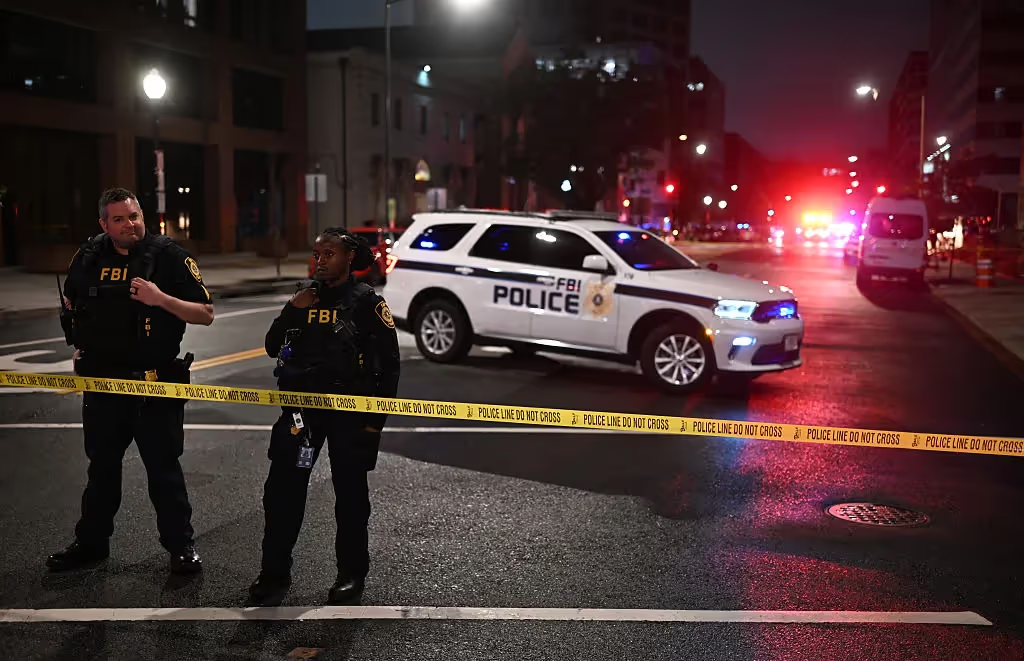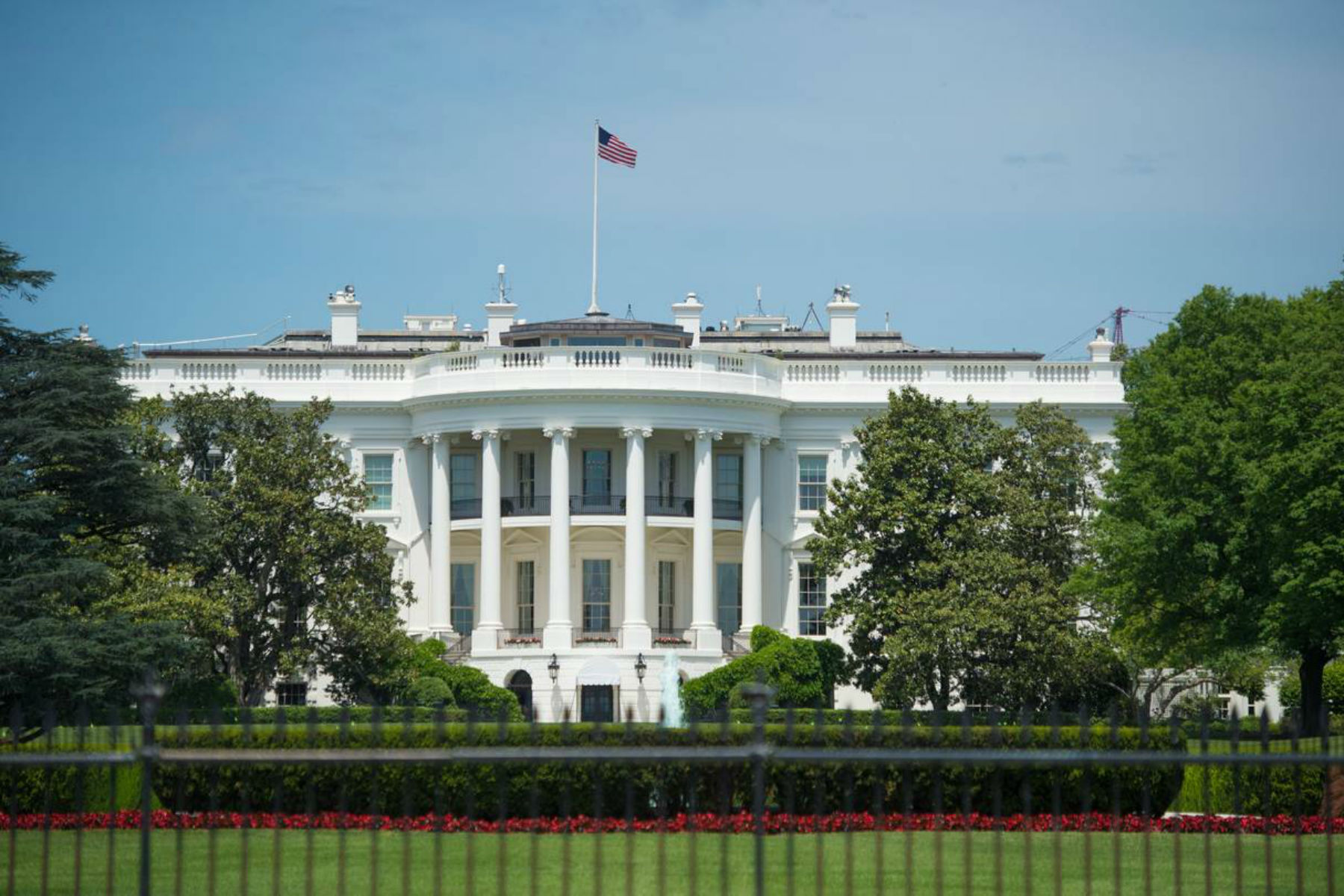
Where Do American Jews Go From Here?
Jewish organizations dedicated to social justice causes must reorient their missions to explicitly defend Jewish interests.
After a left-wing terrorist murdered Israeli embassy staffers Yaron Lischinsky and Sarah Milgrim on Wednesday in Washington, American Jews have expressed grief, outrage, helplessness, and some determination. But there has been minimal shock.
After earlier attacks, such as the shooting at the Tree of Life Synagogue in 2017, that one by a right-wing terrorist, it was still possible for some to think that, in America, such things simply do not happen. In 2025, America has now become a place where Jews are threatened, and where their future as Jews has begun to seem murky.
To be sure, Jews have not been the only targets of political violence. As the writer Walter Kirn put it, the murder of a health care executive by an anarchist terrorist last December demonstrated that a “permission structure” for overtly political street action had been opened. And has happened often in history, Jews have become an especially prominent target.
The war launched by Hamas against Israel on October 7 has been accompanied by a near unprecedented wave of anti-Israel and anti-Jewish demonization, dehumanization, as well as acts of violence. Global propaganda campaigns have been a major plank of every Israeli-Arab war. There was a torrent of Soviet and Arab-sponsored anti-Israel propaganda in the tense months leading up to the Six Day War in June 1967. That spring, President Lyndon Johnson received a torrent of letters from Jewish and non-Jewish Americans imploring him to back Israel. Few urged him to back the Arab side.
If the American public knew where it stood then, the present war is occurring in a quite different country. The media landscape is fragmented. Politics, including foreign policy, are hyper-partisan. There is a fundamental dispute about what makes America exceptional, and thus, why there have been rational grounds for America’s traditional support for Israel.
Israel’s war, too, fundamentally differs from its past engagements. It has already become the longest and perhaps the most difficult in the country’s history, or at least since the 1973 Yom Kippur War. Israel’s founder, David Ben-Gurion, feared long wars because he knew that Israel, much smaller and more vulnerable at the time, could find it hard to maintain international support in a drawn-out struggle. Israel’s current leadership determined – rightly, in my view – that they had to pursue a drawn-out campaign to destroy Hamas, retrieve the hostages, and damage or destroy the Iranian “ring of fire” around its borders that legitimately threatens the viability of the state. But that difficult decision has come with significant costs, for Israelis and Palestinians, to be sure, but also for American Jews.
This war is also occurring in the age of the smartphone, with a screen-addled population bombarded 24/7 with sometimes authentic images and videos of the war. Geo-political “explainers” are presented by influencers whose credentials are often limited to their appealing “vibes,” which are suitable for the targeted demographic. The digital world is thus replete with anti-Israel calumnies and falsehoods and deep anti-Jewish messaging that sometimes, though not always, hides under the veil of anti-Zionism – as if believing in the abolition of the one Jewish state, in 2025, is entirely unconnected to one’s attitude towards Jews.
The DC murders testify all too clearly that extreme and violent anti-Jewish politics have passed from screen to reality. And while such politics have by no means captured American public opinion. Some Americans favorably disposed to Israel have simply wondered about the war aims, particularly in Gaza, which Israel has not always articulated coherently. But simple extremism and anti-Semitic prejudice are making inroads. As the great Zionist founder Vladimir Jabotinsky wrote in a critical 1913 essay on anti-Semitism in Russia, the spreaders of blood libel did not persuade the more respectable folk to adopt this position fully. But their incessant repetition of the calumny raised just enough doubts to make the allegations appear respectable. A similar process seems to be underway now as anti-Semites who are “just asking questions” get more and more play in the fractured media environment.
Unlike in Russia, of course, philo-Semitism and Zionism have deep roots in the American character. Since 1948, support for Israel in American public opinion has appeared almost natural, in contrast to official Washington, where that support has ebbed and flowed. While fierce anti-Israel opinion now seems to be the price of admission (at the minimum) into the intellectual vanguard of the American left, the party itself has a fight on its hands as to whether it will pursue the path forged by pro-Israel moderates such as John Fetterman or the radical wing. And while most normie Republicans have commendably held the line on their defense of Israel and Jews, the growth of an extreme ethno-national sentiment and the rise of openly anti-Semitic far-right commentators and influencers are already changing Republican attitudes. And while instinctively pro-Israel and pro-Jewish, Trump’s administration has been nothing if not unpredictable.
To American Jews, then, the future looks more fragile perhaps than ever before. Warnings of a darker future emanate from Europe as well as Canada, where, in very short order, Jews have become a beleaguered and targeted minority. Jews in Canada and Western Europe, amidst the threat of violence, may be able to appeal for “special protections” from the government successfully. Canadian Jews are currently appealing, understandably, for protest-free “bubble zones” around synagogues and Jewish community centers considering continuing attacks and violent protests carried out by pro-Palestinian activists—something which sounds uncomfortably close to a ghetto. But they can rarely expect to participate in the national life of their states on a free and equal basis, as Jews. This is a frighteningly real possibility for American Jews in the medium term.
There are no easy answers about what American Jews ought to do in light of the new, unclear situation. It is far easier to think about what ought to be revaluated and avoided than what to positively do. As a first matter, mainstream American Jewish organizations ought to reevaluate the universalistic and only atmospherically Jewish messaging and programming that has defined much of their work for decades. As a good start, the ADL has recently refocused, at least to some degree, on combating anti-Jewish action rather than on fighting all kinds of discrimination broadly and perhaps incoherently conceived. Other Jewish organizations dedicated to immigrant rights and other social justice causes should also consider reorienting their missions to defend Jewish interests explicitly. A more concrete Jewish communal politics would permit more productive and honest conversations on priorities, trade-offs, bargaining with other advocacy groups, and so on – a process that the abstract focus on universal issues, such as general immigration advocacy, equity, and tolerance, has hindered.
Rightly understood, Judaism does express a universal ethical message. The dignity of all human beings, the protection of minority rights, the equality of all under a just law – these are Jewish principles as much as they are American ones. They are summed up in the immortal words of Deuteronomy: “Remember you were strangers in the land of Egypt.” Thus, combating bigotry in general and defending equal rights ought certainly to be a part of any Jewish politics. But there is a world of difference between defending the rights of all within the American regime and failing to counter, or in some cases even working to advance, the interests of people and organizations who hate you while openly denying the principle in Deuteronomy or the Declaration of Independence.
The well-meaning attempt to universalize Jewish politics in the United States has proven ineffective or even counterproductive in many instances. Exhibit A of what not to do is Robert Kraft’s project on “combating anti-Semitism,” which has produced billboards and lavishly produced commercials with abstract messaging focusing on “ending hate” rather than explicitly calling out Jew hatred. A recent “stop hate” ad by the group, shown in the Super Bowl, has no Jewish content whatsoever, featuring simply a rainbow cast of different characters urging an end to hate. An uninformed viewer of this ad might reasonably conclude that it is the dastardly Jews or the Israelis who are stoking the hate and are standing in the way of universal harmony.
I am skeptical that such messaging, even if better wrought, would be up to the challenge of rebuking anti-Jewish politics. As Reuven Brenner has argued, historically, anti-Semitism has been a leading indicator of a society with failed or decaying governing institutions. Beyond concrete advocacy for Jewish interests, perhaps the deepest fight for the Jewish future in America lies in reforming and revitalizing American institutions and contributing to America’s national success. The Robert Krafts of the world should thus feel an obligation to help rebuild America’s national vitality and defend Jewish interests simultaneously.
Both the successful reconstruction of American institutions and an intelligent defense of Jewish interests depend on educated citizens filling those offices. I have argued in the past that the central failure of American Jewish organizations has been the prioritization of fashionable causes over the transmission of basic literacy in Hebrew language and culture – the basic price of admission into the splendors and absurdities of Judaism. Absent this kind of rigorous education, no Jewish future in the diaspora is conceivable, regardless of favorable political conditions. Reinvesting in serious Jewish education at the K-12 level ought now to be the absolute highest priority of the American Jewish community in general.
As events at Columbia and elsewhere testify, many prestigious colleges and universities have failed in their basic and more elevated responsibilities of equipping a public-spirited elite. It thus falls to exciting new initiatives, such as the Civitas Institute at Texas and Florida’s Hamilton School (where I teach), to continue elucidating and defending the civilizational contributions of Jerusalem, Athens, and Philadelphia. Jewish and biblical ideas, as a vital node in the story of America and the West, ought to form an essential plank in the revitalization of the civic and classical education movement now growing in exciting ways, and which will hopefully finally produce a better elite than the one we currently have.
Happily, America is not Europe. American Jews do not face the situation of European Jews. The American public has demonstrated the capacity to rally behind American ideas. And American Jews benefit from friends and allies, unlike their peers in any other nation. In strongly advocating for a Jewish future in the United States, American Jews can feel confident that they are also working to advance the cause of America, which, as George Washington wrote, quoting the Hebrew Congregation of Newport, “gives to bigotry no sanction, and persecution no assistance.”
Neil Rogachevsky is Assistant Professor of Humanities in the Hamilton School of Classical and Civic Education at the University of Florida. He previously taught at the Straus Center for Torah and Western Thought at Yeshiva University. He is coauthor with Dov Zigler of Israel’s Declaration of Independence: The History and Political Theory of the Nation’s Founding Moment (Cambridge University Press, 2023), which won the Concordia University-Azrieli prize for Best Book in Israel Studies for 2023.
Politics

National Civitas Institute Poll: Americans are Anxious and Frustrated, Creating a Challenging Environment for Leaders
The poll reveals a deeply pessimistic American electorate, with a majority convinced the nation is on the wrong track.
.webp)
Liberal Democracy Reexamined: Leo Strauss on Alexis de Tocqueville
This article explores Leo Strauss’s thoughts on Alexis de Tocqueville in his 1954 “Natural Right” course transcript.
%20(1).avif)
Long Distance Migration as a Two-Step Sorting Process: The Resettlement of Californians in Texas
Here we press the question of whether the well-documented stream of migrants relocating from California to Texas has been sufficient to alter the political complexion of the destination state.
%20(3).avif)
Who's That Knocking? A Study of the Strategic Choices Facing Large-Scale Grassroots Canvassing Efforts
Although there is a consensus that personalized forms of campaign outreach are more likely to be effective at either mobilizing or even persuading voters, there remains uncertainty about how campaigns should implement get-out-the-vote (GOTV) programs, especially at a truly expansive scale.

California’s Green Policies Destroy Blue-Collar Jobs
The problem here lies not with racism, or lack of reparations, as Newsom and “progressives” insist, but with their own policies, which devastate minority communities.

There's a Perception Gap With the U.S. Economy
As we approach another election cycle, it’s worth asking: what’s real, what’s political theater, and what does it all mean if Democrats regain control of the House?
.jpg)
Confusion about Commandeering
State governments are not instrumentalities or vassals of the federal government but rather sovereign entities with their own legal authority.

A Climate Science Manual for Judges Discredits Itself
All is not well with the Reference Manual for Scientific Evidence. This is a loss for the public trust of science.



.avif)









